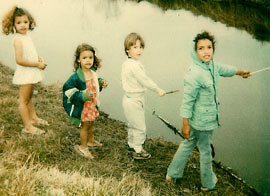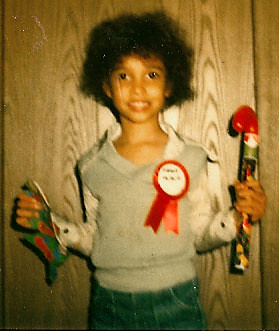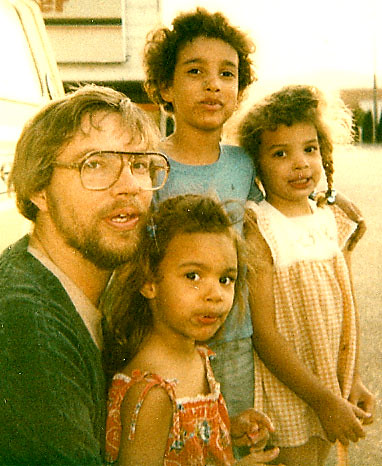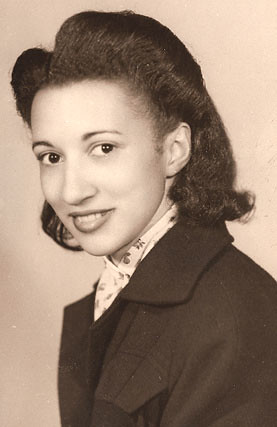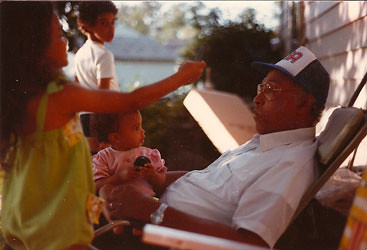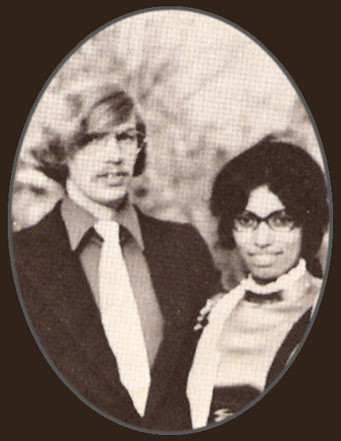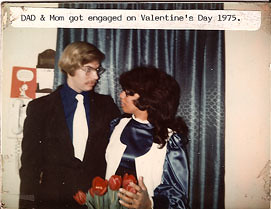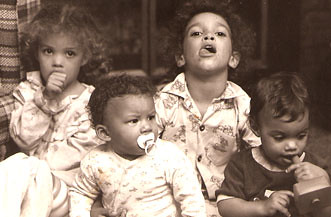The following are things that I've been raised to believe, read or assumed were true, overheard, or was told directly by people who did mean well when pointing out the state of my being of mixed race:
"Being a mixed person means never having to choose between two racial groups...you are both at the same time" - my mom (African American/Seminole/Cherokee)
"Because you are both black and white you can talk to probably anybody and they'll understand you. You could probably understand them the same way too." - my dad (Swedish/Norwegian)
"You are black." - my mother's father (African American/German/Native American)
"So you're like an oreo cookie: black outside, but white in the middle!" - childhood classmate
"...the 'Tragic Mulatto'..." - one of many strange phrases I heard in passing
"You don't look anything like your dad." - college roommate
"That's not your dad! You're making that up!' - coworker, upon seeing a photo of my father
"I think of myself as more black than mixed." my sister
"I think of myself as more part Native American...like Cherokee, or Seminole - whatever we are...?" - same sister, a few years later.
(All mixed people should be, and are, always more beautiful than averagely racial people)
- magazine ads, billboards, Hollywood
"I would never want to be white...just being white is so boring!" - my mother
"So...my man..how're you doing?" - my dad to me , shortly after I entered high school
"Do you ever get confused for being black?" - high school friend (Korean)
"Do you want to be black or white or indian?" - another high school friend
"If you really are an indian, why don't you go around dressing like one all the time" - 11 year old boy at the local YMCA when I was in high school
"I could not imagine my white mom with my dad - if he was not white too!" - childhood friend (French Canadian)
"Do your parents even like each other. I mean, they're so different." - the childhood friend's sister (French Canadian)
(Mixed people are racially androgynous. They represent the melting pot of America and quite possibly the world) - what mixed race models in non-profit campaigns, pregnancy help billboards, family and health care initiative signage have shown me
"Actually, you're not black or white, Jason. You're just a human being." - my dad
"Hey, I'm part black." - white high school friend whose mother had an African American boyfriend at the time
"What's the big deal about racism anyway? Can't we all just put it behind us?"
- a white college kid on Oprah when I was 13 years old
(Mixed girls and guys are SEXY. Everyone wants to have SEX with them because MIXED GIRLS and GUYS are SO HOT!) - most mixed race groups, blogs and chatrooms online
"Mixed people are just more advanced and intelligent than people of one racial background...we are what God intended people to be." - my mother
I don't care about any of that racial stuff...I married your mom just because I love her." - my dad
"White people are crazy! So are black people too!" - my mother's mother (Seminole/Cherokee)
"White people will git you!" - my mom's younger brother
"Your sisters have what we call 'good hair'. They're lucky." - my mom's younger sister
"Jason Klanderoo? I thought that was how you said your name...I thought you were French." - biracial friend after college (white/japanese)
"Halfrican." - 15 year old African American high school youth group student, statement made to me
. . .
These thoughts are ever present with me. Reading them, now, gives me a good idea of how misunderstanding most people are about a mixed person. More revealing, though, are how these thoughts have seemed to not only follow me - but truly form what I think of myself as a person.
My feelings?
They range from aggravated to insecure, isolated to annoyed. Often angry and feeling lost.
I also feel like I'm one of a kind. I feel important to be so well exposed to many different and varied relational experiences that, I truly believe, most people will never if rarely encounter in this life. I am challenged in a good way; to understand life and the people in it. This includes understanding myself.
Being a mixed person in 2008? What is that like exactly? We hear about 'illegals' in the news today, Mexican immigrants looking for a better life in America without a green card. I was born just shy of a decade of being illegal myself.
My wife, being the historian, shared with me that the United States still enforced anti-miscegenation laws until the late 1960's. That simply meant that you could go to jail or prison for marrying someone of another race. Both of our parents were alive during that time and if not aware of the literal laws, quickly understood the unwritten ones.
That will be discussion for another day, but I'd like to end this post again with a few questions for those of you who either are of mixed race, or are a friend or relative of someone who is:
When asking a person who is neither clearly one race or another a personal question about race, why is their an assumption that this person would associate so strongly with one particular race above another?
If someone is of at least two different racial backgrounds, are any of their 'racially identifiable' characteristics important to point out and to point out often?
(ex. having a 'black nose', 'white hair', knappy hair', 'slanty eyes', 'good skin', etc.)
Is this how a person is to be identified? "Hey it's the good hair girl!" "Yo, lightskinned!"
Are mixed race people, people? Who are they, anyways? What do they have to say?
